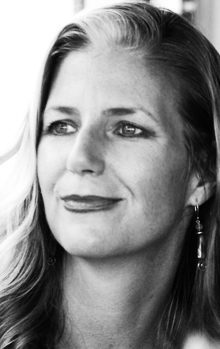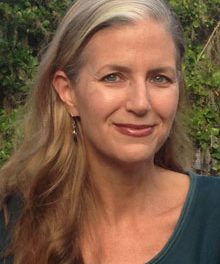 Last weekend, a remarkable woman spoke to our congregation about her life as a missionary in Africa. She and her husband were commissioned on their honeymoon, 27 years ago, and have been living there ever since. He works with AIDS patients, she with orphans. They have eight children of their own – ranging from very young to grown – several of whom are adopted. This woman radiated a kind of earthy joy that was irresistible to me. Though there was nothing chic or glamorous about her, I found her the very definition of beautiful.
Last weekend, a remarkable woman spoke to our congregation about her life as a missionary in Africa. She and her husband were commissioned on their honeymoon, 27 years ago, and have been living there ever since. He works with AIDS patients, she with orphans. They have eight children of their own – ranging from very young to grown – several of whom are adopted. This woman radiated a kind of earthy joy that was irresistible to me. Though there was nothing chic or glamorous about her, I found her the very definition of beautiful.
As I listened to her talk about her life – a life of challenge and sacrifice and real physical hardship – I was overcome by two conflicting emotions: inspiration… and shame.
“What the heck am I doing with my life?” I wondered. It wasn’t the first time.
So, to continue that trend – the “not-doing-much-of-anything” thing – I shared my experience on Facebook the next day. Lots of people chimed in with comments, gamely attempting to help me justify my existence. (Thanks, gang!)
“People like that amaze me,” one friend said. “But remember, they are few and far between. The rest of us cast our light on our places in life in our own way.”
(Uh huh. Like starting Monday morning discussion threads on Facebook.)
“Like you, I know that I could do more,” said another friend. “Hell, we all could. But I try to be gentle with myself! It is always wonderful to be inspired by those who seem to go above and beyond what I feel capable of.”
(Above and beyond a rousing Facebook discussion, you mean?)
“You are doing just fine,” said another. “Remember, Margaret, that you have people who need you here. Not everyone can be a missionary.”
(That’s right. Some of us are called to initiate scintillating, life-transforming conversations on Facebook.)
Another wrote, “You’re doing plenty… ‘Blessed are the peacemakers.’
(This, I believe, was a reference to my column, which increasingly – and tiresomely, perhaps – reads like a variation on “Kumbaya”… without the drums. On the bright side, it actually appears in print. Not just on Facebook.)
“You are asked to brighten the corner where you are,” said another friend. “Don’t sell yourself short.”
At this point, I wanted to pull my hair out. Somehow, all these nice compliments and peppy expressions of solidarity were making me feel worse.
Scanning down the thread, I saw that another friend had quoted Bono, saying, “I can’t change the world, but I can change a world in me.”
While it was semi-comforting to know that even Bono doesn’t think he’s doing enough… I still felt crappy.
I started making a mental list of all the things I’d done for others lately. Others outside my immediate family and friends, that is. It was a very short list.
“But, I have a good excuse!” I told myself. “My plate is full! I’ve got a job and a house and a child and two cats…”
Oh, who was I kidding? I have no excuse. Well, okay – laziness, selfishness and lack of initiative are all excuses. But I certainly don’t have a good reason.
Don’t get me wrong. I step up occasionally – a committee here, a task force there. I drop money in the collection plate and the Salvation Army bucket. And I am unfailingly nice. (I’m southern. Of course I’m nice.) But these things are so small. So slight. So lame compared to harrowing missionary work in Africa…
What little I do manage to do for others – whether it be friends or family or church or community – well, that stuff couldn’t possibly count, because it brings me too much satisfaction. I like helping people! And writing my “peacemaker” column? It’s a discipline, and a huge a pain sometimes, but I can’t imagine my life without it. This column connects me with others – and with my own heart – and gives me license to express wild ideas and emotions that would otherwise churn and fester in my head. Or on Facebook.
If it’s fulfilling and rewarding, it’s not really sacrifice, is it? We shouldn’t expect gain for our pain, should we? If we do, it’s just another exercise in selfishness. Right?
With these questions burning a hole in my frontal lobe, I returned to my Facebook discussion thread. (What? You were expecting Kierkegaard or Proust?)
Another friend had written: “The most important thing you’ll ever do is raise a vibrant, intelligent young woman who will make you crazy for five years and then love you forever, while you are able to see the fruits of your labor blossom into the fine adult woman you raised.”
That sounded good. Real good. But again, there was too much in it for me. Too big a pay-off. Sure, there’d be five years of “crazy.” But then, all that forever love… and all those blossoming fruits…
Nope, this wouldn’t cut it. Motherhood – while certainly trying and exhausting and self-sacrificial – was just too pleasing, too beneficial to yours truly, to stack up against missionary work in Africa. I would get back as much as I gave! In fact, I already do.
And then it dawned on me: Duh. That’s the whole point! You get back as much as you give. And that’s a good thing.
After all, I wasn’t drawn to the missionary lady because she seemed dour and miserable and long-suffering. In fact, she seemed anything but. It was her radiant joy – grounded in something like radiant peace – that had fascinated me and drawn me in. She was just so… different. So unlike myself or anyone I know. Almost like an exotic bird. I wanted what she had.
Surely I don’t have to go to Africa to get it. Do I?
We Americans live in a culture that venerates professional achievement and success. Unfortunately, we measure that success in terms of financial reward. We aim for bigger houses and better cars, always looking to “move up”… to the nicest neighborhoods with the best schools and the biggest golf courses. We strive to keep ourselves in skinny jeans and pedicures and highlights, then wonder why they don’t make us happy for long. We cheer ourselves up by popping a pill or shopping for shoes. Always the temporary, superficial fix. We have plenty of selfless impulses, but we undermine them with selfish ones… organizing charity events, then obsessing over what to wear to them. Sensing something’s wrong, we turn to one self-help book after another, but this constant fixation on helping ourselves is, in reality, part of the problem.
Those of us who long to get off this train – who, at some point, recognize it’s going nowhere – are often uncertain where to turn. We make little changes, and they help, but we dream of big changes. Drastic changes. Like, maybe… becoming missionaries in Africa?
For most of us, this isn’t an option. Or so we tell ourselves.
So we go to the movies.
My daughter and I have seen “The Hunger Games” together three times now, and have been reading the trilogy of books by Suzanne Collins. Amelia is enthralled with the story of Katniss Everdeen, a courageous girl who struggles to survive – and care for her family – in a futuristic dystopia of unfathomable darkness and danger. In the story, the forces of evil are represented by the Capital, a ruling city of wealth, decadence and corruption.
“I love how the people in District 12 (Katniss’s home) have to hunt for their food in the woods,” Amelia told me. “They have to fend for themselves and take care of each other. They don’t have fancy clothes or makeup or hairstyles, like they do in the Capital. I love that. And I really love how they don’t have much technology!”
This from the girl who watches TV with an iPod in one hand and a cell phone in the other. What’s going on here?
Plenty, I think. Certainly more than I can address in 100 words, which is about all I’ve left myself room for. So maybe this is Part One of a series. Maybe not. I’m not sure I have an answer to my question, and even if I offered one, I’d just be one more voice in the babbling cacophony of voices competing to be heard here in the Capital. There are so many people with answers these days. (Many of them have written self-help books!) I’m still in the question phase, myself.
If that changes, you’ll be the first to know.





